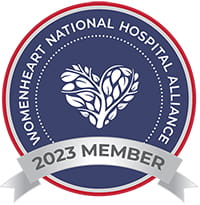Have a heart to heart with one of our cardiologists
At Main Line Health, our cardiac experts understand the unique heart health needs of women. We take pride in showcasing a team of accomplished female cardiologists, cardiovascular surgeon and advanced practice providers. We work in close collaboration to ensure you get the very best care and attention.
We believe that a woman's perspective is priceless when it comes to matters of the heart.
Heart disease is the single most common cause of death in women and men. In many cases, heart disease is preventable. It can manifest differently in women compared to men, and addressing these gender-specific nuances is critical for effective prevention, diagnosis and treatment.
The Women’s Heart Initiative team provides education, emotional support and encouragement for all women facing heart health journey. We’re committed to keeping you informed of risk factors and connecting you to specialists, all while advancing life-saving research to improve treatment and outcomes for women.
Taking care of our hearts begins with knowledge and awareness, followed by desire and supporting action. Be an advocate for your heart health.
